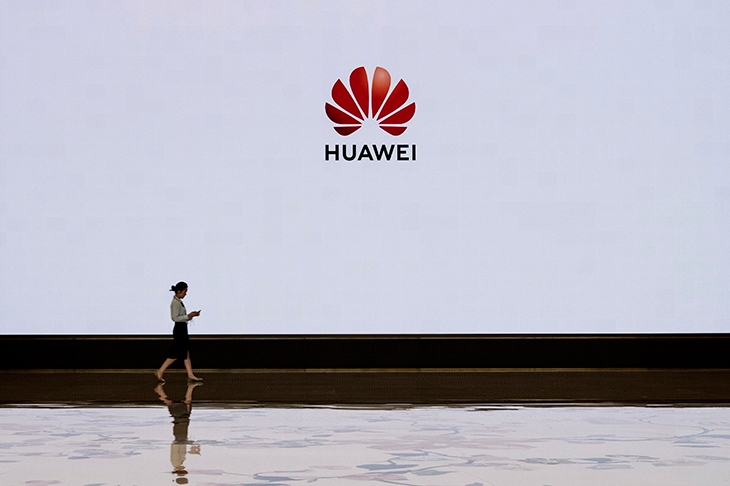‘Just rejoice’, as Mrs Thatcher once said about something else. The government’s decision to debug our national security by getting rid of Huawei is the right one (although seven years is much too long). The puzzle is why it did not happen earlier. At the end of January, I interviewed the US Secretary of State, Mike Pompeo, when he came over here. We knew by then everything we needed to know about the Chinese government’s control of Huawei and the lack of trust this must engender. The British government also heard clearly from Mr Pompeo — and from Australia — that its preference for Huawei 5G threatened the deep trust of the Five Eyes intelligence partnership. Yet it sent him away empty-handed. I was struck at the time by how calm Mr Pompeo seemed about this, and I guessed he had received private assurances of change. I now think I was wrong: it was simply that he had picked up the growing political pressure against Huawei on both sides of British politics, and understood the wider movement of events even before Covid-19 took hold. Why, despite the well-aimed shafts of Tom Tugendhat’s China Research Group, did our government not? There was a sort of corruption here. I do not mean anything like direct bribes: more the sense that the Cameron/Osborne Golden Era of relations with China was, rather like the EU, a happy, easy, money-spinning thing for those running British policy and the relevant big British businesses, such as BT. With his experience as London mayor during the Olympics, it probably seemed a happy, easy thing for Boris Johnson himself. Unfortunately, happiness and ease are never available from a totalitarian superpower.
‘Huawei’s 5G path is blocked. In a few months’ time, Huawei may no longer see the point of paying six-figure sums to Lord B and his attendant knights,’ I wrote in this space on 20 June. I underrated its ruthlessness. It took only a few weeks. Lord Browne, its UK chairman, is out. Sir Ken Olisa has followed. How much longer for the arch-Remainers Sir Andrew Cahn, who thinks Huawei is ‘the John Lewis of China’, and the ex-CBI Sir Mike Rake, who joined as recently as April? All this could have been avoided if, before taking the six-figure salary, these gentlemen had asked: ‘Who ultimately controls this company’s destiny?’ The answer is the Chinese Communist party. If they had internalised that thought, they would never have joined the board.
The Black Lives Matter frenzy against statues may have passed its peak. The issue has been co-opted by the bureaucracies in government, Church, universities, etc. As their various committees study lists of allegedly offensive monuments, they should remember something which has hardly been mentioned: localism. Most statues are erected not because of a general national sentiment, but because of the wishes of a particular community — a borough, parish, college, profession, business or regiment. They were not put up, like those colossal statues of Lenin in the former Eastern Bloc, by order of a remote tyranny. The reason that Edward Colston’s statue stayed up so long in Bristol was that many Bristolians admired his munificent legacy to the city. The statue of a protesting black woman surreptitiously placed on its site this week has no such communal endorsement. As a general rule in a free country, if a statue is to be taken down at all, it should be by the desire of the people who live with it. This principle needs defending by those at the top in order to protect those at the bottom. From now on, a small village, club, school or charity could be assailed for an image that zealotry has suddenly decided to decry. They lack the legal and financial resources to resist. There are thousands such. Already I know ones which are frightened. I shall not name them, because that would only make things worse. They badly need support.
It is the general sense of lacking support which has damaged church life so badly in the lockdown. The Church of England, as a national institution, and even at diocesan level, has devoted far more energy to gold-plating government rules for closing churches and issuing quite breathtakingly long procedural instructions about reopening than to helping parishes help their flocks. The Archbishop of Canterbury even said that church services were not ‘an essential service’, as if he were the Most Reverend Gerald Ratner. When the Church’s leadership has intervened in public, it has brought contention, not help. The first such intervention was against Dominic Cummings’s famous journey to Barnard Castle, where the bishops expressed themselves with tabloid virulence. The second was in favour of taking down statues and the wickedness of ‘white’ Jesuses. On Thought for the Day this week, I heard the Archbishop’s chaplain say we must listen to the unheard. She should get her boss to practise what she preaches, and listen to disconsolate, church-going Christians. If she can find him, that is. A friend fed up with church closures wrote recently to complain to him at Lambeth Palace. Her letter was returned, carrying the stamp ‘Addressee gone away’.
I should declare an interest. Our grandson Patrick was born just before the lockdown, and we were waiting impatiently for him to be christened. This finally happened, kindly administered by the priest, last Sunday. Covid-compliant, she had to follow the rule that holy oil could not be applied to his forehead. Water, however, was graciously permitted.
Studying my Guardian Saturday pull-out ‘Black History the timeline’ (‘History isn’t about the past. More and more, it’s about the present’), I read that the Emperor Septimius Severus (145-211) was born in Africa, as was St Augustine of Hippo (354-430). It is not clear why this information is present. There is no reason to think either was black. Septimius may have been part-Punic, Augustine part-Berber, but that is not the same thing. They were no more black than Ian Smith, the prime minister of Rhodesia (now Zimbabwe), who was also born in Africa but does not feature in the timeline.
Got something to add? Join the discussion and comment below.
Get 10 issues for just $10
Subscribe to The Spectator Australia today for the next 10 magazine issues, plus full online access, for just $10.
You might disagree with half of it, but you’ll enjoy reading all of it. Try your first month for free, then just $2 a week for the remainder of your first year.















Comments
Don't miss out
Join the conversation with other Spectator Australia readers. Subscribe to leave a comment.
SUBSCRIBEAlready a subscriber? Log in